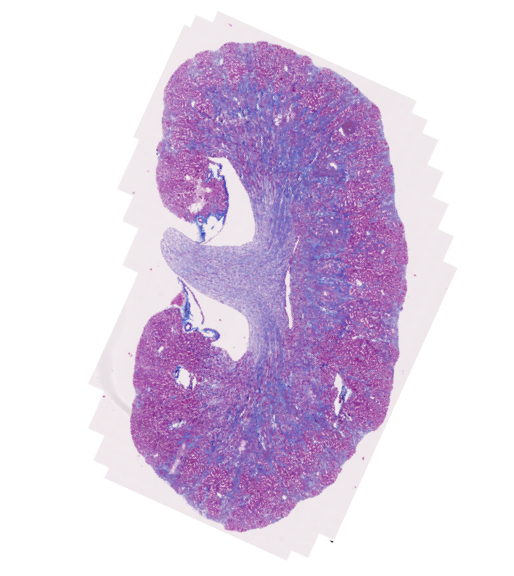
Injury-related damage in a mouse chronic kidney disease model (Image by Jing Liu/McMahon Lab)
“Edye and I have been impressed by the work of scientists at the Broad stem cell centers,” said Eli Broad. “We hope that, with these grants and others, they can continue to transform how some of the most devastating diseases are understood and treated.”
In one project, Andy McMahon, director of USC’s stem cell research center, and his colleagues will explore the mechanisms that drive normal repair in the adult kidney. Pietro Cippa, a postdoctoral fellow in the McMahon Lab at USC, and Kun Zhang from UC Diego will bring their expertise to the multi-institutional scientific team.
The scientists will develop a finely tuned experimental protocol for damaging kidneys—but not so severely that they cannot repair. The current protocol is too extreme: after clamping off the kidney’s primary blood supply, the organ fails to repair, becomes fibrotic and ceases to function. By inducing more moderate damage, McMahon’s team aims to more accurately model the typical kidney injuries sustained by patients, and to analyze the gene activity of the cells involved in the natural process of organ repair.
“Our longterm goal is to identify and optimize the mechanisms of kidney repair, so that they can be used to enhance healing in patients who have sustained damage to this vital organ,” said McMahon.
In the other USC-based project, Scott E. Fraser and Justin Ichida—faculty members in the Department of Stem Cell Biology and Regenerative Medicine—will develop an improved method for labeling different cell types derived from human induced pluripotent stem cells (iPSCs).
The team will adapt an approach, developed by the Fraser lab, that enables labeling different proteins simply by introducing small pieces of genetic information into human cells. The team will use this method to modify iPSCs such that they express different fluorescent tags when they develop into the various major cell types of the nervous system. By observing the fluorescent tags under a sophisticated microscope, they will be able to visually distinguish the different types of living cells in a brain-like structure.
“Our labeling system will make it easier, less expensive and more efficient to use iPSCs from patients to study a wide variety of diseases in a personalized way,” said Ichida.
The Fund for Innovative Stem Cell Research is also supporting projects at UCLA and UC San Francisco addressing heart disease, neurological diseases, asthma, immune diseases and leukemia.
“I’d like to thank The Broad Foundation not only for their support of this innovative, early-stage research, but also for their 10 years of unwavering commitment to advancing stem cell research in California and beyond,” said McMahon. “The Broads’ longterm investment is making it possible for us to usher in the future of medicine.”
By Cristy Lytal